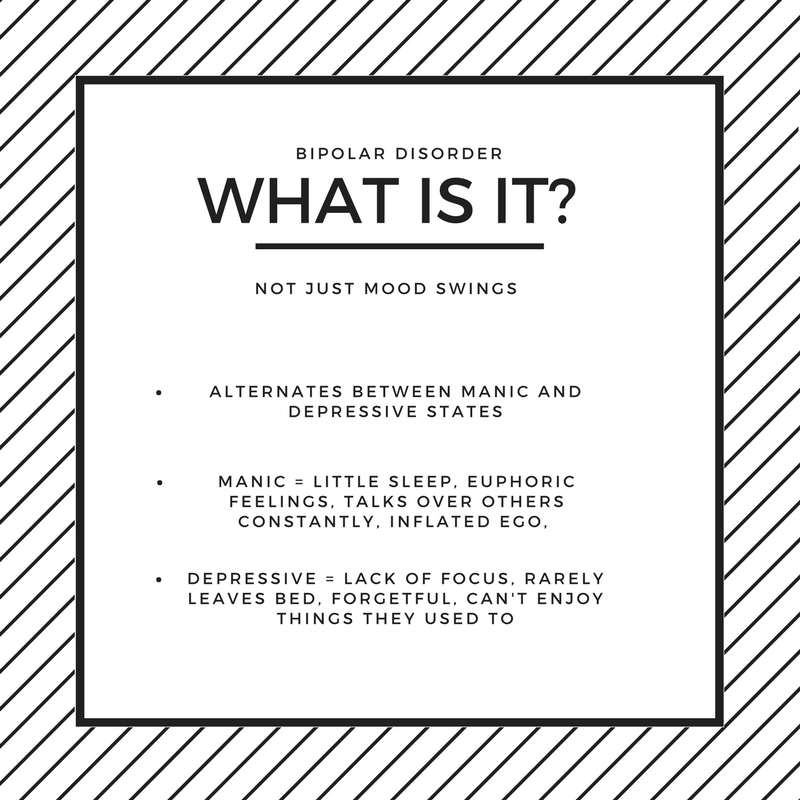
Bipolar Disorder: What it is and isn’t
Throughout my life I have heard many people refer to someone as being “bipolar” but never understand the true meaning of that word. Most often, it is used to describe a person’s mood swings however minor or major. While mood swings in some way are a part of the disorder, it is not a complete indicator of this illness. In fact, mood swings can be an indicator of many varying disorders (or even temporary conditions) and therefore it takes an expert to truly help the person who is suffering. I believe that it is important for the cause of destigmatizing mental illness to create awareness of these varying disorders so that you can gain a better understanding of your family and peers who may be suffering.
What is it?
Bipolar disorder is mostly common in adults. While it does occur in children, this is the type of disorder that is often triggered after adolescence. Additionally, unlike what is normally viewed as a “mood swing” a person with bipolar disorder will have a long episode of a high mood- a week or more- and then a long episode of a low mood. These moods are very intense and are labeled as “manic” and “depressive” episodes.
Manic
When the person with bipolar disorder is in a manic state, they make very risky or indulgent decisions. They rarely sleep and are often starting projects (and often not finishing them). They are more creative, euphoric, and can even seem pleasant and motivating to be around. Some people in this state are not happy and upbeat but rather they are irritable and suicidal. They have the energy to accomplish whatever they want, good or bad. Many will even have a very inflated ego- thinking they can concur the world- while forgetting or ignoring any possible consequences. Pressured talking is another symptom of this state. The person will talk incessantly without letting you get a word in. Even if you try to respond, they may just talk over you. This is different than someone who is just normally a chatty person. Someone with bipolar disorder will be significantly chattier during that manic stage than when they seem to be acting themselves.
Depressive
The depressive state can look like typical depression or worse. The person may never leave their bed for days, or even if they do, they may be extra tired as they try to accomplish small things throughout the day. This state can be a very difficult time because it can interfere with work, school, and relationships. They feel like they can’t enjoy anything they used to be able to. They are forgetful and can’t seem to focus on anything.
This disorder can be debilitating and often brings about unfair stereotypes about the person. While is can be difficult to understand if you haven’t suffered, you can still be knowledgeable and compassionate toward someone who is. If you think a loved one is suffering, let them know that you care about them and that you want to see them feel at peace and safe in their life, again.
Unfortunately, drug and alcohol use is another commonality among people who suffer from bipolar disorder. If you or a loved one is suffering from a mood disorder and substance use disorder, Lifeline Connections may be the right place for you. We serve the Vancouver, WA and Portland, OR areas with our mental health and co-occurring outpatient treatment. You will be treated with a customized treatment plan, peer support, and new wellness skills that will provide you with the tools you need to go onto living a happy and enjoyable life free from the chains of addiction. If you feel that you are ready to get help or at least to start asking questions, please call or email us at 360-397-8246 ext 7465 or [email protected].
